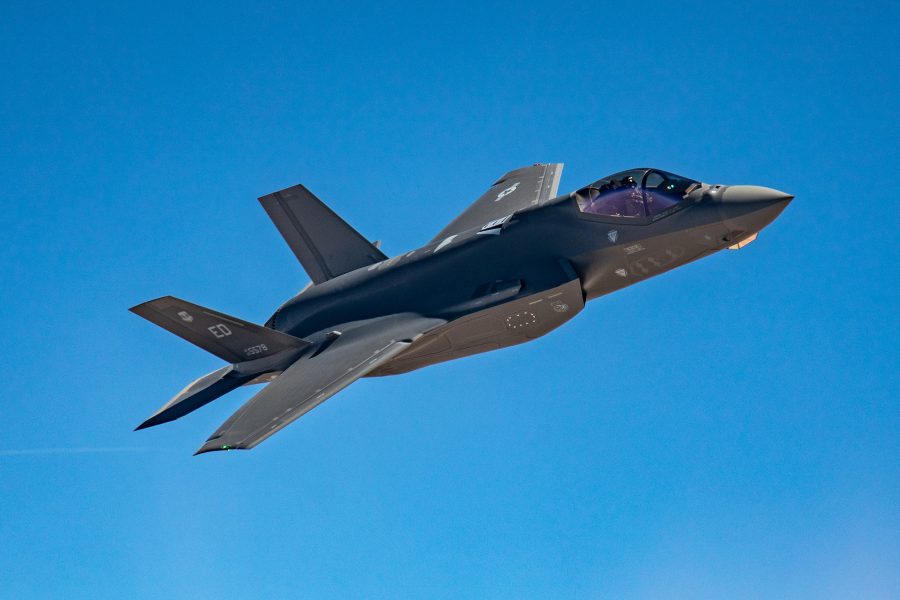EDWARDS AIR FORCE BASE, Calif.—The Air Force has a word of caution for those advocating for autonomous aircraft to supplant crewed fighters: It’s better to have a human in the loop.
Air Force Chief of Staff Gen. David W. Allvin says the rise of autonomous systems is clear, but an Air Force made up of drones with minds of their own choosing targets is not in the best interests of the nation.
“My own belief is that the future is really in [creating] the most effective human-machine teaming,” Allvin said at the Reagan National Defense Forum on Dec. 7. “Warfare is always a human endeavor,” Allvin added. “The money to be made here in the future in innovation is developing capabilities that maximize the best-performing human and machine on the battle space.”
Elon Musk, the billionaire owner of SpaceX and Tesla and advisor to President-elect Donald Trump, has said for years that the age of manned combat aircraft is over, even stunning a ballroom crowded with air combat practitioners at AFA’s 2020 Air Warfare Symposium. More recently, Musk made waves on X, the social media platform he owns, by suggesting the F-35 Lightning II fighter jet be scrapped in favor of autonomous platforms.
Musk is set to co-chair a presidential commission that will advise Trump on ways to slash federal spending. He and other Silicon Valley technology titans are vying for influence in the new administration.
Allvin’s remarks, made in response to a question about Musk’s comments, came at a gathering of defense industry executives, members of Congress, and the media. He suggested that an all-autonomous force would make warfare “too easy,” while he and others counter that the advances in remote-control warfare are significant but not yet reliable and adaptable enough to be counted on.
The subject of autonomous systems was also front and center earlier in that week when a small group of reporters descended on Edwards Air Force Base, Calif., for a peek at what the Air Force sees as the future of war.
“There may be some day we can completely rely on robotized warfare,” Brig. Gen. Douglas P. Wickert, the commander of the 412th Test Wing at Edwards, said on Dec. 5. But such a concept could be years, decades, or even “centuries away.” Predictions that self-driving cars would be ready by now have proved overblown, and Tesla and others have struggled to get the technology far enough along to be commercially viable.
The dynamic environment of air combat is much more complex. Speed, aerial dynamics, opposition forces, and weapons ramp up the technical challenges. The Air Force is eager to adopt Collaborative Combat Aircraft, uncrewed jets that can be directed, if not completely controlled, by pilots operating F-35s or other combat jets.
The Air Force deferred a decision on its crewed Next Generation Air Dominance penetrating combat aircraft, leaving that call to the incoming Trump administration. That decision will have major cost implications far beyond this one program. For now, CCA are to be controlled by platforms such as the F-35.
“We’re all about advancing the system,” Lt. Col. Philip Jackson, a senior Air Force test pilot at Edwards who commands the 461st Flight Test Squadron of F-35s, said, referring to future combat aircraft. “The more autonomy I can give you in the aircraft, it doesn’t change your job. It just might change your location, but you’re still going to be somewhere in the chain. Just like the same reason we have pilots flying airliners. I need a human to be responsible, ultimately, when life and death is on the line, right?”
There is a refrain among high-tech enthusiasts that “AI is coming for you,” noted Jackson, who echoed Allvin’s theme about man-machine teaming. “I’m like, ‘Yeah, eventually.’ There are so many hurdles to get through.”
“What I’m excited about, honestly: take this aircraft and put a fleet of CCA that are capable of flying with it, executing missions off of it,” Jackson continued from under the shade of one of the F-35s he flies. “That’s a pretty amazing capability as well.”
